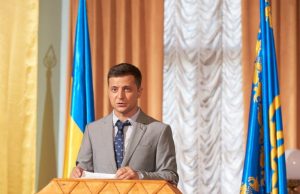This was the very reason for holding the First Global Cyber Security Summit 2017 (GCS17) in Kiev.
The event gathered participants and speakers from 15 countries of the world like Ukraine, Israel, USA, Sweden, Switzerland, Poland and others. More than 500 representatives of the industry, government machinery, business circles and diplomatic corps discussed topical cyber security issues. Predictably, that one of the main topics of the Global Cybersecurity Summit 2017 was the bitter political conflict between Russia and Ukraine.
The Deputy Head of the Presidential Administration for Reforms Coordination, Innovations and Change Management Dmytro Shymkiv, the Deputy Minister of Education and Science Roman Greba and the Chairman of the Committee for Informatization and Communication of the Verkhovna Rada of Ukraine Olexandr Danchenko decided to discuss national security problems at GCS2017.
The Secretary of the National Security and Defense Council of Ukraine Oleksandr Turchynov could not attend the event personally, so his statement was read out at the Summit, in which Mr. Turchynov put emphasis on cyber-attacks from the northern neighbor:
“Ukraine as a state with unique experience of counteracting Russian hybrid aggression has also gained experience in countering threats from cyberspace. This is about attempts to interfere in the election of the President of Ukraine in 2014, attacks on the energy and financial sectors of our country, as well as attempts to disable the national transport system. In fact, Ukraine has become a training range for testing the advanced cyber weapons of the aggressor country.”
This opinion is also shared by the foreign speaker of the Summit Anthony Blinken, former US Deputy Secretary of State and Assistant to US President Barack Obama. In particular, Mr. Blinken stressed the importance for the country to hold the Summit:
“This global cyber security summit is very important. This is actually a global problem that concerns many countries, not only the USA, but, for example, Ukraine. It has become, probably, one of the first victims of hacker attacks on critical infrastructure facilities: energy, banking, hospitals.”
The US Ambassador to Ukraine Marie Yovanovitch agrees with him. At the Summit, she told that in 2015, the Ukrainian energy system was the first target in the world of cyber-attacks. Marie expressed her gratitude to the local experts for sharing their experience and thus helping to avoid similar occurrences in the USA.
“Ukrainian professionals drew a lesson from it, and in December 2016, the Ukrainian energy system already withstood and successfully repelled the cyber-attack. As we know, such attacks also affected the Ministry of Defense and the Ministry of Transport. The USA expresses gratitude to the Ukrainian experts for the opportunity to exchange cyber threats information, which assisted America to defend itself against similar attacks directed at state and government agencies.”
Another important topic of the summit was the interaction of private business and state structures. The Chairman of the Committee for Informatization and Communication of the Verkhovna Rada of Ukraine Alexander Danchenko spoke this out in his speech at the summit:
“The main issues of all European conferences are cyber security this year. Recently, I was in Tallinn at EuroDIG, attended by the Presidents of Estonia, Lithuania, the Prime Minister of Norway and others. So, everyone is saying that cyber defense is the first-priority problem in the defense of any country. Unfortunately, Ukraine became a hybrid war victim, and at the same time, there is not a single cyber security law in the country. The two- year old events, when Russia carried out attacks on private energy enterprises, showed how important it was the interaction of private companies and the government machinery in sharing experience in cyber security developments and planning.”
He is backed up by Dmytro Shymkiv, Deputy Head of the Presidential Administration, responsible for Reforms Coordination, Innovations and Change Management:
“The national security problem is quite topical in Ukraine. We must have self-regulating machinery, as in the USA. When private companies join the government, sharing information about the threats that arise in the private sector and can be similar at the national level.”
The cyber security problem is acute not only in Ukraine, but also worldwide. Countries are paying increasing attention to this field at national and private levels, since this is not only the job of hackers and programmers, but also of lawyers, economists and diplomats.
Interesting facts about cyber security in Ukraine and the world:
42 Ukrainian higher education institutions train cyber security professionals. However, this is more negative than positive, because there are lots graduated specialists, and therefore their work is not adequately appreciated.
100 thousand Ukrainians work for export, dealing with cyber security in other countries of the world. This is the third position in the world in terms of exporting these services.
USD 3.2 billion is the amount of Ukrainian professionals’ annual cyber security services export.
USD 1 trillion are planned by the USA to invest in cyber security in the coming years.
* The summit is held under the aegis of the Ministry of Economic Development and Trade of Ukraine, the Committee for Informatization and Communications of the Verkhovna Rada of Ukraine, the State Finance Innovation Institution, the Kharkiv Regional Office in Washington. The organizers are the International Agency for Regional Development GloBee and LLC Mercury. The cyber security partner is Symantec.
At the conclusion of panel discussions, the speakers, business leaders and public officials kept on informal communication at a private dinner aboard the motorship “Silver Wave”, sponsored by JohnnieWalker, The Singleton of Dufftown, Latinium and Casillero del Diablo.
Global Cybersecurity Summit 2017 records without translation: day one and day two
Global Cybersecurity Summit 2017 entry with translation: day one and day two

















